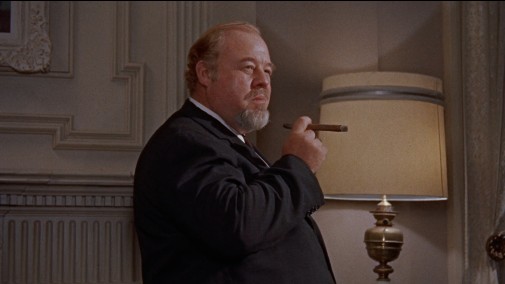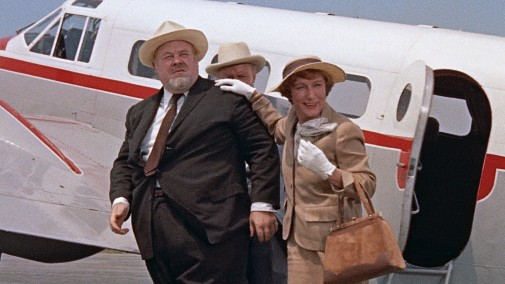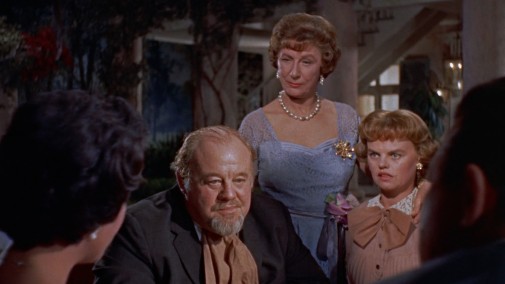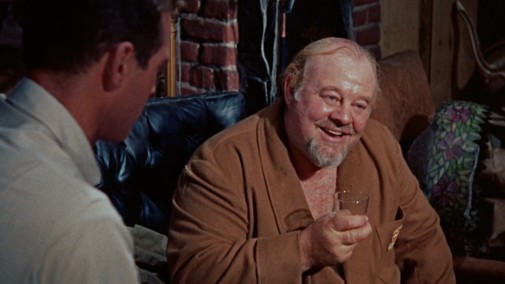
In 1958, Burl Ives won the Academy Award for Best Supporting Actor. Some cinephiles would, understandably, assume that the great honor came to him as a reward for his legendary turn as Big Daddy in the silver screen adaptation of Tennessee Williams' Cat on a Hot Tin Roof. It wasn't so, however. Burl Ives did indeed win his Oscar for playing the impassioned patriarch of some portentous American clan, but it was for a story set in the arid landscapes of the Far West rather than the humid heat of Mississippi. The winning movie was William Wyler's The Big Country, a sublime epic of its genre whose taste for cruelty is only matched by the lushness of its score. It's not a well-remembered flick despite its quality, and, while great, Ives' supporting turn pales in comparison to what he did as Big Daddy in Cat on a Hot Tin Roof that same cinematic year...

We hear about Big Daddy long before we ever lay eyes on him. Even though the narrative of Cat on a Hot Tin Roof is shaped by the marital agonies of Paul Newman's Brick and Elizabeth Taylor's Maggie, Burl Ives' commanding pater familias is the sun around which the other characters orbit. Even when he's absent, people can't stop talking about Big Daddy, whether in mercenary adulation or genuine respect. In the afternoon and dark night during which the story unfolds, the great man is celebrating his birthday. The occasion is all the more notable and stress-inducing because he's just returned from a hospital stay following a health crisis.
The specter of Death hovers over him at all times and questions of legacy, inheritance, and wealth ring throughout everyone's ears. He might not know it yet, but the end is near for Big Daddy and the conclusion to his sorry tale is bound to be painful in more ways than one. That being said, when we first see him, he is as magnificent as ever. Exiting his private plane unto a near-empty airport, Big Daddy's a man with a powerful presence. His body might be ridden with sickness, but he still bellows loud and walks into a room as if he owns it. In a way, the idea of incoming Death when contrasted with such a robust presence becomes even more disturbing than it already is. Big Daddy shouldn't die, he should be constant, a titan as old and eternal as the landscape.

Still, he does feel awfully tired, like a big balloon slowly losing its air. Burl Ives weaponizes his screen presence to show us why Big Daddy has earned his name, but he still peppers the characterization with dissonant notes, little screeches of unexpected pain, doubt, and exhaustion. Contempt itself bears the cross of infirm weariness when it comes to Big Daddy. There's an unmistakable disgust in the way he gazes at his bratty grandchildren and their over-fertile mother. However, the scorn is equal parts condescending superiority and bone-deep fatigue caused by their antics. He's had enough boot-licking to last a lifetime, and only feels at home when alone with people as openly hostile as he is. No wonder he's so enlivened when talking to Brick or Maggie.
To make it sound like Ives' turn is nothing but boisterous presence with a note of emotional sourness thrown in would be a crime, though. The actor had plenty of range and the role of Big Daddy makes great use of it. Notice how he modulates the character's bitterness into comedy, sitting emphatically still while the birthday party explodes around him. With his dark suit and dark mood, Big Daddy's composure is hilarious to behold. On the opposite end of the spectrum, Ives makes his scenes with Newman vibrate, a live-wire of parental despair running through every word thrown at the younger man. Brick is like a puzzle that Big Daddy can't solve – if he can't fix it with shouting, one gets the feeling that he'll smash that puzzle against a wall until it sorts itself out. Agony begets destruction in this household.

And then, there's the plain ugliness of Big Daddy, which coexists with the power, the comedy, the illness, and despair. His casual cruelty towards Big Momma is one of the film's most cutting elements and one of Ives' sharpest choices. She's loved him for years, even his hate, but he likes to see her hurt. Either that or he doesn't care about her pain. Maybe he once did, but has forgotten, one more piece of his soul lost to the passage of time and the accumulation of wealth. Because of that hard carapace of inhumanity built up over decades, Big Daddy's eventual epiphanies are all the more impactful. So much of the performance is about suggesting what Big Daddy knows or doesn't know, a veil of mystery that's teased but never completely lifted, that it can be shocking when knowledge his shoved right in the man's face and personal growth is pulled out of him, kicking and screaming all the way.

The moment when Brick tells him the truth about Big Daddy's health is astounding. One can almost see the claws of Death closing over this man's heart. The fulgor extinguishes, leaving behind only the tired old man that's desperately clawing at life and legacy in hopes of escaping the doom that awaits us all. It's grotesque and it is sad. Weirdly enough, it is in the reminiscence of loss that Big Daddy seems to regain a semblance of happiness, of hope, finding a light that cuts through the darkness. When he remembers the love of his dead father, Ives loosens up, he allows genuine sentiment to shine through his performance with no philter of patriarchal imperiousness. It's amazing to behold, a soul laid bare and beautiful, rueful regret blossoming into gratitude and love. By the movie's end, he's more alive than he was at its start, and Ives seems to have been reborn in front of our eyes.

When faced with such magnificence, it can be hard to return to the matter of the Oscars and its dumfounding results. Even so, that's what we must do.
Considering that The Big Country got only one other nomination besides Ives and that Cat on a Hot Tin Roof conquered a grand total of six Academy Award nominations, it's difficult to see why AMPAS chose to honor Ives for the former rather than the latter. Richard Brooks' movie even earned a Best Picture nod, making it the logical vehicle for which the Academy could honor Ives in 1958. The main problem seems to have been a debilitating category confusion. Despite Paul Newman and Elizabeth Taylor being the clear protagonists of Cat on a Hot Tin Roof, the magnitude of Ives' role might have prompted the studio, and maybe even the actor himself, to campaign as a lead. In any case, the greatness he showed as Big Daddy helped him secure some rightly earned goodwill and precious votes for The Big Country. In the end, the right performer won the 1958 Best Supporting Actor Oscar.

Cat on a Hot Tin Roof is available to stream on the Criterion Channel as part of its "Marriage Stories" collection. You can also rent it online from the usual places.